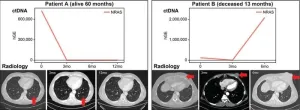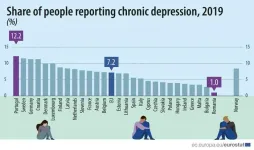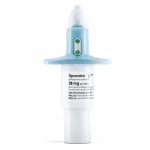(Press-News.org) Tirzepatide is as effective at treating early-onset type 2 diabetes (T2D), a more aggressive form of the condition that normally responds less well to treatment, as it is at treating T2D diagnosed later in life, new research being presented at the Annual Meeting of the European Association for the Study of Diabetes (EASD) in Hamburg, Germany (2-6 Oct) has found.
Tirzepatide belongs to a new class of drugs that mimic the effect of two hormones involved in blood sugar control and appetite suppression, glucagon-like peptide-1 (GLP-1) and glucose-dependent insulinotropic polypeptide (GIP).
The drug, a once-weekly injection, was approved as T2D treatment in the US in May 20221 and was recently (September 2023) given approval as a treatment for some people with T2D in England.2
T2D, the most common form of diabetes, usually occurs in middle-aged and older people. However, onset at a younger age is becoming more common globally.
Young-onset T2D or early-onset type 2 diabetes (EOT2D, diagnosis before the age of 40) is more aggressive. The insulin-producing beta cells in the pancreas deteriorate more quickly in people with EOT2D than those with later-onset T2D.
Evidence for this includes data from the SURPASS programme. In this series of clinical trials designed to assess tirzepatide’s potential as a treatment for T2D3, those with young-onset T2D were in worse overall health than those with later-onset T2D. Despite being younger, those with early-onset T2D had higher blood sugar levels, higher mean body weight and BMI and higher levels of blood fats that increase the risk of cardiovascular disease, than those with later-onset T2D.
Individuals with early-onset T2D also respond less well to treatments. Despite this, there has been little research on the management of the condition.
Professor Melanie Davies, of the University of Leicester, Leicester UK, and colleagues in the US used data from the SURPASS programme (SURPASS-1, -2, -3 and -5) to assess the effect of tirzepatide on glycaemic control, body weight and cardiometabolic markers in EOT2D. Three different doses of tirzepatide were tested in SURPASS: 5mg, 10mg and 15mg.
The analysis compared changes in mean HbA1c (average blood sugar level), body weight and cardiometabolic markers including waist circumference (WC), lipids and blood pressure in participants with young-onset (N=873, 20.5%) and later-onset T2D (N=3,394, 79.5%) after 40 or 52 weeks of treatment with tirzepatide.
Tirzepatide was found to be equally effective in young and later-onset T2D. It led to similar improvements in HbA1c and body weight in young and later-onset T2D at Week 40/52 at all three doses. Tirzepatide (all doses) also improved waist circumference, lipids (triglycerides and HDL) and systolic blood pressure similarly in both groups.
Professor Davies concludes: “Early-onset type 2 diabetes is not only more aggressive, it usually responds less well to drugs, which means our findings are really encouraging.
“Further research is now needed to evaluate whether starting treatment with tirzepatide and similar drugs early improves long-term outcomes in this important group.”
To arrange an interview, please contact Professor Davies by email:
Professor Melanie Davies, University of Leicester, Leicester UK. E) melanie.davies@uhl-tr.nhs.uk
Alternative contact: Tony Kirby in the EASD media centre. T) +44 7834 385827 E) tony@tonykirby.com
Notes to editors:
References:
1. https://www.fda.gov/news-events/press-announcements/fda-approves-novel-dual-targeted-treatment-type-2-diabetes
2. https://www.nice.org.uk/news/article/nice-committee-recommends-tirzepatide-as-new-treatment-option-for-people-with-type-2-diabetes#
3. https://www.jomes.org/journal/view.html?doi=10.7570/jomes22067
This press release is based on abstract 621 at the annual meeting of the European Association for the Study of Diabetes (EASD). The material has been peer reviewed by the congress selection committee.
There is no full paper at this stage.
END
Tirzepatide is as effective at treating early-onset type 2 diabetes as diabetes diagnosed later in life
2023-10-05
ELSE PRESS RELEASES FROM THIS DATE:
Commonly prescribed antibiotic, antipsychotic and prokinetic drugs are associated with a higher risk of sudden cardiac arrest (SCA) in people with type 2 diabetes, study finds
2023-10-05
New research being presented at the Annual Meeting of the European Association for the Study of Diabetes (EASD) in Hamburg, Germany (2-6 Oct) has identified a range of characteristics associated with a higher risk of sudden cardiac arrest in individuals with type 2 diabetes.
These include the some commonly prescribed antibiotic and antipsychotic drugs, prokinetics (drugs used to treat gastrointestinal symptoms such as nausea and vomiting) and low fasting blood sugar.
Sudden cardiac arrest (SCA) is a leading cause of death. ...
Study reveals distinct illness trajectory in the years leading up to type 2 diabetes diagnosis
2023-10-05
New research presented at this year’s Annual Meeting of The European Association for the Study of Diabetes (EASD), Hamburg (2-6 Oct), reveals a marked increase in several common conditions in the years leading up to, and immediately prior to, type 2 diabetes diagnosis, suggesting considerably earlier diagnosis might be possible in some patients.
“These novel insights into the onset and natural progression of type 2 diabetes, suggest an early phase of inflammation-related disease activity long before any clinical diagnosis of type 2 diabetes is made”, says senior author Dr Adrian Heald from Manchester ...
Is lasting remission of type 2 diabetes feasible in the real-world setting?
2023-10-05
At this year’s Annual Meeting of the European Association for the Study of Diabetes (EASD) in Hamburg, Germany (2-6 Oct) experts will discuss if lasting remission from diabetes is feasible in the real-world setting.
Professor Roy Taylor of Newcastle University, Newcastle, UK, will be speaking in support of the motion
Professor Taylor will argue that through a series of studies in which people with type 2 diabetes were put on low calorie diets, he has shown that lasting remission of type 2 diabetes is indeed feasible in the real world.
He will begin ...
Second international consensus report - clinical translation of precision diabetes medicine
2023-10-05
Precision medicine is part of the logical evolution of contemporary evidence-based medicine that seeks to reduce errors and optimise outcomes when making medical decisions and health recommendations. Diabetes affects hundreds of millions of people worldwide, many of whom will develop life-threatening complications and die prematurely.
“Diabetes recommendations often focus on what works well for the average person. However, because diabetes is an incredibly heterogeneous disease, few people are Mr or Mrs “average” and one-size-fits-all ...
Wastewater surveillance research provides a 12-day lead time for RSV season: new study
2023-10-04
In a first-of-its-kind study, researchers using wastewater surveillance over conventional indicators have predicted the start of the annual respiratory syncytial virus (RSV) season 12 days early, providing more lead time for hospital preparedness and the timely initiation of RSV prevention therapy provided by the province for at risk-infants and young children.
Published in Frontiers in Public Health, the study is the first to describe the relationship between wastewater measurements and clinical data for RSV and to use near real-time wastewater measurements to accurately identify the start of the RSV season.
Working in close collaboration with CHEO Research Institute (RI) ...
Unmet health needs for HIV, hypertension and diabetes in rural South Africa
2023-10-04
The burden of non-communicable diseases like hypertension and diabetes is increasing globally, especially in low-income and middle-income countries where they occur alongside epidemics of communicable diseases like HIV. A large public health survey in South Africa led by Emily Wong, M.D., has assessed the multimorbidity health needs of individuals and communities in rural KwaZulu-Natal and established a framework to quantify met and unmet health needs for individuals living with infectious and non-communicable diseases. The study is published in The Lancet Global Health.
“Applying ...
Blood-based biomarker may redefine the future treatment for advanced melanoma
2023-10-04
Circulating tumor DNA (ctDNA) is emerging as a blood-based biomarker for many solid tumor types, including melanoma. A new study that assessed ctDNA in the blood of patients with BRAF wild-type (BRAF WT) stage III and IV melanoma concludes that measuring ctDNA may lead to alternative treatment options and better outcomes for these patients, report investigators in The Journal of Molecular Diagnostics, published by Elsevier.
For patients with BRAF WT stage III and IV melanoma, there is an urgent clinical need to identify prognostic biomarkers and biomarkers to predict treatment ...
Advances from MSK researchers reported at 2023 ASTRO Meeting
2023-10-04
Researchers from Memorial Sloan Kettering Cancer Center (MSK) were recognized for their achievements at the 2023 meeting of ASTRO, the American Society for Therapeutic Radiology and Oncology. Teams reported new findings about radiation-induced secondary cancers, a new guidance system for radiation therapy, and the consequences of insurance denials, among other topics.
At the meeting, held from October 1 to October 4, 2023, in San Diego, Simon Powell, MD, PhD, FRCP, Chair of MSK’s Department of Radiation Oncology and Enid A. Haupt Chair in Radiation Oncology, was honored with ASTRO’s Gold Medal Award. This award is ASTRO’s highest honor, bestowed upon ...
Ketamine-related drug gives better treatment for difficult to treat clinical depression
2023-10-04
Type of work: peer-reviewed/clinical trial/people
A major clinical trial shows that the drug, esketamine, one of the two main forms of ketamine, outperforms one of the standard treatments for treatment-resistant major depression. This industry-funded work is presented for the first time at the 36th ECNP Congress in Barcelona, with publication in the peer-reviewed journal the New England Journal of Medicine (see Notes for details).
Clinical depression (also known as MDD, major depressive disorder) affects a significant number of people at any one time, giving ...
Esketamine nasal spray: an option for patients with treatment-resistant depression
2023-10-04
Understanding Treatment-Resistant Depression
Treatment-resistant depression (TRD) is a particularly challenging form of major depressive disorder. As Albino Oliveira-Maia, head of the Champalimaud Foundation’s Neuropsychiatry Unit and the study’s national coordinator for Portugal, explains, “TRD is defined as the persistence of depressive symptoms despite adequate courses of at least two different antidepressant medications”. Despite repeated therapeutic attempts, these patients’ depressive symptoms ...




